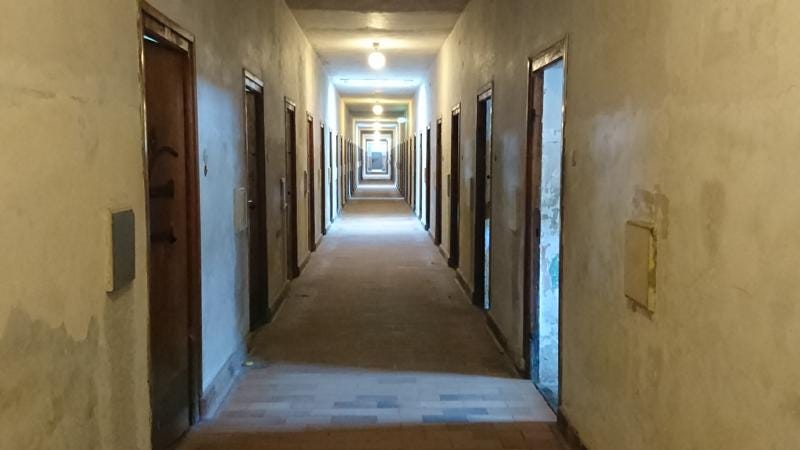#102: I believe in (Wo)Man's Search for Meaning

Happy Friday!
My name is David Charles and I believe in Man's Search for Meaning
Remember when I said last week that from now on I'd be focussing on one theme every month? Well, a week is a long time in newsletters and, quite frankly, I'm scrapping that idea. Most of it, anyway.
Why? To be honest, it just wasn't a good idea, and no one should be beholden to things that aren't a good idea even though they announced them very loudly and in public.
Also because this week we must travel the final cables of our long Odyssey through the work of Viktor Frankl.
We've spent the last 27 weeks reading Man's Search for Meaning, and this is week 28: the last five pages. And I'm sure you'll agree that it's an absolute humdinger and deserves the full focus of this humble newsletter.
Without further ado, here's Frankl.
Now On: The Viktor Frankl 5-a-day Book Club!
Membership Criteria: Read 5 pages a day of Man's Search for Meaning to complete the whole darn text in only 28 days.
Catch up on whole book online.
You can also read today's instalment online.
Day 28
Today's pages (p149-154) commence with the second aspect of Viktor Frankl's 'tragic triad': guilt. How can we find meaning in our lives in spite of the presence of guilt?
For Frankl, no crime is fully explicable. No crime can be 'fully traced back to biological, psychological and/or sociological factors', he writes.
Totally explaining one's crime would be tantamount to explaining away his or her guilt and to seeing in him or her not a free and responsible human being but a machine to be repaired.
Indeed, to explain away such a crime would be to do a disservice to criminals themselves. Instead, Frankl recognises the freedom of the criminal act - and the criminal's responsibility for 'overcoming guilt by rising above it, by growing beyond [themselves], by changing for the better'.
The twin aspects of freedom and responsibility that are the foundations of Frankl's philosophy make our guilty acts both a matter of personal choice and an opportunity to find meaning by facing up to our behaviour and overcoming it.
Frankl also argues that 'collective guilt' - holding one person responsible for the behaviour of another - is totally unjustified. This is an incredibly powerful statement from a man who was himself the victim of a state policy of collective condemnation and punishment.
The final aspect of the tragic triad is death.
Frankl begins by pointing out that each moment is 'dying'; each moment is transitory, and this fact alone 'challenges us to make the best possible use of each moment of our lives'.
Live as if you were living for the second time and had acted as wrongly the first time as you are about to act now.
Tongue-twister it might be, but Frankl's imperative forces us to face the death of the moment, and to double check with ourselves that we are taking the right action.
[A]s soon as we have used an opportunity and have actualised a potential meaning, we have done so once and for all.
Note the choice of words: opportunities are not 'taken' for Frankl, but 'used'. Opportunities to make meaning in our lives are not eternally floating out there in space, just waiting to be taken. Opportunities for meaning are successive moments that are used up, whether we are consciously aware of the fact or not.
Such opportunties present themselves quite literally in the present, but the past is just as important to Frankl's concept of responsibility:
[P]eople tend to see only the stubble fields of transitoriness but overlook and forget the full granaries of the past into which they have brought the harvest of their lives: the deeds done, the loves loved, and last but not least, the sufferings they have gone through with courage and dignity.
When we make use of an opportunity, we have 'rescued' a potential meaning and 'safely delivered and deposited' it into the past, where it is 'irrevocably stored and treasured'. It is with the past, with our memories of meanings actualised, that we hold ourselves to account.
Hence Frankl's imperative.
Take a moment's pause before you act.
Imagine you have been reincarnated (or that it's Groundhog Day or that you've gone Back To The Future) and that this is actually the second time you are living this moment. Déjà vue!
Remember that the first time this happened you did the same dumb thing you were about to do YET AGAIN just before Step #1. Zut alors!
You are now free to change your choice. Will you?
WOOMPH.
In today's society, we don't value the past as highly as Frankl does. For Frankl, it is the elderly, not the young, who should be envied:
It is true that the old have no opportunities, no possibilities in the future. But they have more than that. Instead of possibilities in the future, they have realities in the past - the potentialities they have actualised , the meanings they have fulfilled, the values they have realised - and nothing and nobody can ever remove these assets from the past.
Frankl's final words in Man's Search for Meaning are a call to join the ranks of the 'saints' or 'decent people'.
For the world is in a bad state, but everything will become still worse unless each of us does his best. ... Since Auschwitz we know what man is capable of. And since Hiroshima we know what is at stake.
Thank you for reading Man's Search for Meaning with me over these past months. I hope you've found something useful in my rehashing. I know I have!
FICTION-NON-FICTION
Snippets from my reading this week.
FICTION
Our Man in Havana by Graham Greene (1958)
'That fool dressed up as a Colonel said something about "your country". I said, "What do you mean by his country? A flag someone invented tow hundred years ago? The Bench of Bishops arguing about divorce and the House of Commons shouting Ya at each other across the floor? Or do you mean the T.U.C. and British Railways and the Co-op? ... And we don't believe you any more when you say you want peace and justice and freedom. What kind of freedom? You want your careers." ... A country is more a family than a Parliamentary system.'
NON-FICTION
What a Plant Knows by Daniel Chamovitz (2012)
A plant feels what type of environment it lives in. ... An arabidopsis plant that's touched a few times a day in the lab will be much squatter, and flower much later, than one that's left to its own accord. Simply stroking its leaves three times a day completely changes its physical development. While this change in overall growth takes many days for us to witness, the initial cellular response is actually quite rapid.
Thanks for the loan of your eyeballs, and may you have a glorious weekend!
If I may make a suggestion: take advantage of the moon's first slivers tonight by going for a night walk. Make sure you move exceedingly slowly, slow enough to wonder whether or not you're bored, and pause every 10 paces or so to take in the vastness of the universe. Why not?
Much love,
- dc

CREDITS
David Charles wrote this newsletter. David is co-writer of BBC Radio sitcom Foiled, and also writes for The Bike Project, Elevate and Thighs of Steel. He can be found here: davidcharles.info and on Twitter @dcisbusy

The Natural History Museum has announced the winners of the 2018 Wildlife Photographer of the Year contest. Via Kottke.org.


